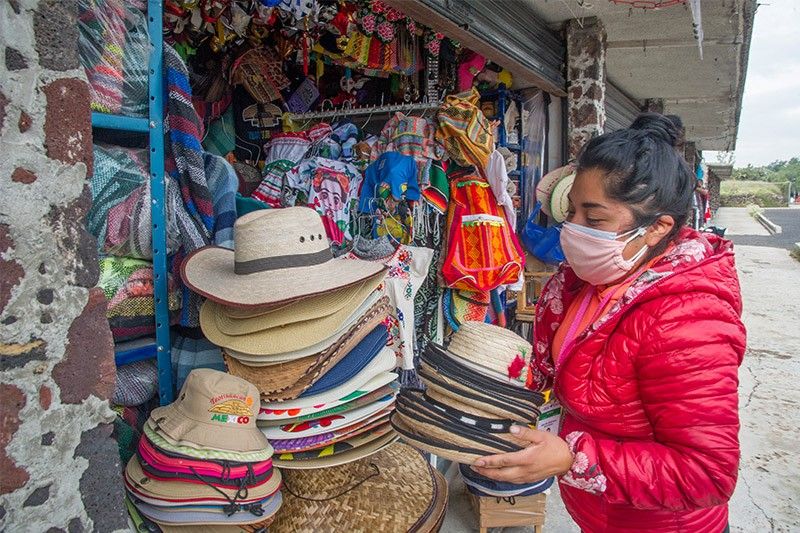'They put a price on everything': extortion hits Mexican economy

APATZINGAN, Mexico — Plots of land lie empty among lime and banana plantations in one of Mexico's most violent regions -- abandoned by their owners due to widespread extortion squeezing Latin America's second-largest economy.
As in many other agricultural zones around the country, criminal gangs in the western state of Michoacan have become a major market force, driving up costs and hurting not just farmers but also consumers.
Take limes, for example: despite a national increase in production, and a slowing of overall consumer price inflation, the cost of the citrus fruit rose by more than 50 percent in the past year, according to the Agricultural Market Consulting Group (GCMA), a consulting firm.
The impact is huge in a country where limes are a vital ingredient in many dishes.
"The prices are through the roof!" said Gabriela Jacobo, a 53-year-old housewife who now only buys a few limes a week.
The threat from organized crime is such that trucks transporting limes now have police escorts, AFP reporters saw during a visit to the region.
The fallout has even been felt in Mexico City, where drug and gang violence is often seen as a faraway problem and the ability to source food from all around the country eases supply problems.
The price of limes in the capital doubled, reaching almost $4.5 per kilo ($2 per pound) in August.
"It's not because of a supply issue," but because of extortion, said GCMA analyst Juan Carlos Anaya.
Turf wars
Michoacan, which covers an area as big as Costa Rica, is riven by bloody turf wars between rival gangs such as the Jalisco New Generation Cartel, Los Viagras and La Familia Michoacana.
As well as fighting over drug smuggling routes, they also compete to make money through extortion.
Payment is taken in the form of a charge of 11 US cents to package each kilo of limes, a farmer told AFP, speaking on condition of anonymity due to fear of reprisal.
It may not sound like much, but the region can produce about 900 tons of the fruit every day.
In the past, "the criminals had their fights but they left us to work. Now they don't even leave us to work,'" the farmer said.
Tomato, banana and mango producers, as well as transporters and distributors, must also pay the gangs, he said.
"They put a price on everything," he added.
Extortion and theft cost companies in Mexico about 120 billion pesos ($6.8 billion) a year, equivalent to 0.67 percent of the country's annual economic output, according to official figures.
In the southern state of Chiapas, extortion and violence have caused food shortages in communities bordering Guatemala.
"There's no electricity. There's no food. There's no water. There's no gas," a resident told AFP.
The region is gripped by a turf war between the Jalisco New Generation and Sinaloa cartels that has led to dozens of business closures and forced locals to buy supplies in Guatemala, at higher cost.
Even the ingredients for tortillas -- a Mexican staple -- are being purchased across the border.
Cities such as Chilpancingo, the capital of southern Guerrero state, also saw widespread closures of chicken shops in the past after farmers and merchants who allegedly refused to pay extortion were murdered.
'Deep trouble'
Avocado growers have also fallen prey to the battle for control of Michoacan's agricultural riches.
Last year the United States briefly suspended avocado imports from the state after a US inspector checking export shipments before the Super Bowl received phone threats.
To confront crime, lime producers like Hipolito Mora founded self-defense groups in 2013 that were themselves later accused of links to criminals.
After vehemently denouncing drug traffickers, Mora was shot dead in June in Michoacan.
"We're in deep trouble with the cartels," said his brother Guadalupe Mora, who was being watched over by several bodyguards.
"They charge us a fee for everything -- basic foods, soft drinks, beers, chicken. Everything's very expensive because of them," he said.
State prosecutor Rodrigo Gonzalez urged people to come forward to report such crimes.
"We're committed to fighting these people, identifying them, arresting them and bringing them to court," he said.
But many fear they will suffer the same fate as Mora if they speak up.
Despite the risks, the farmer said that he had no intention to leave his land.
"Lots of people depend on us and our work, to provide for their families," he said.
- Latest
- Trending






























